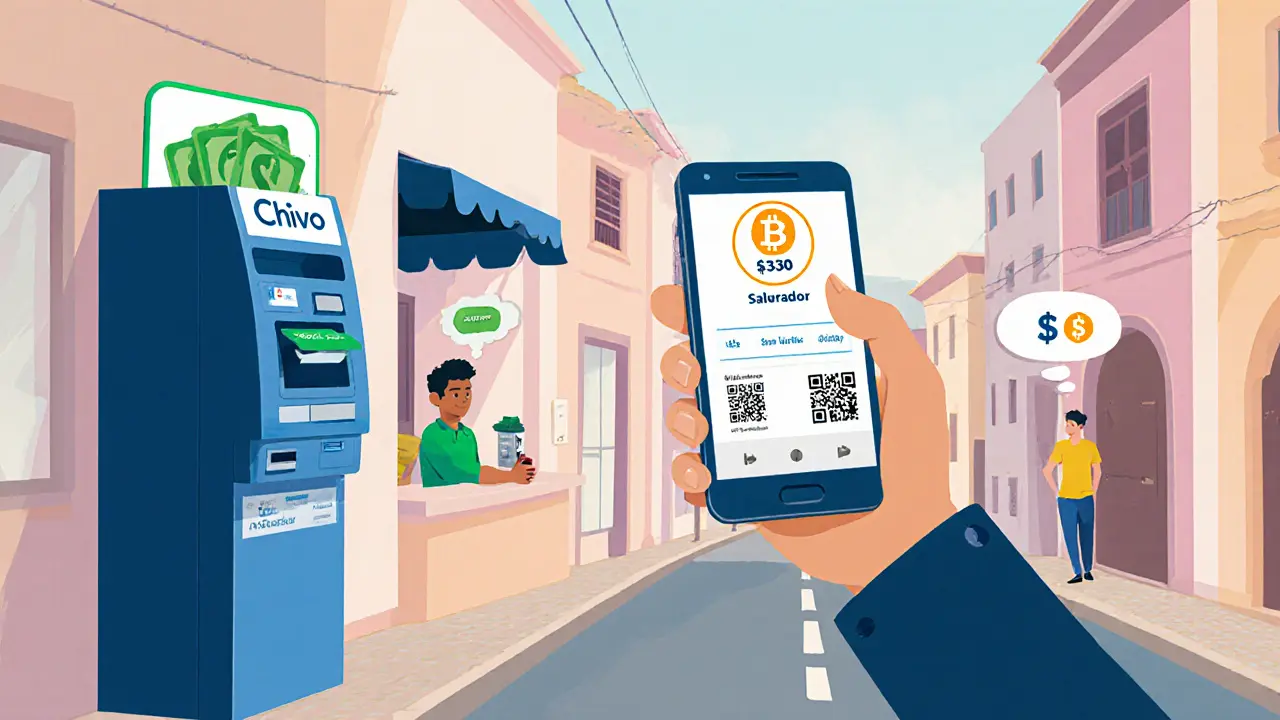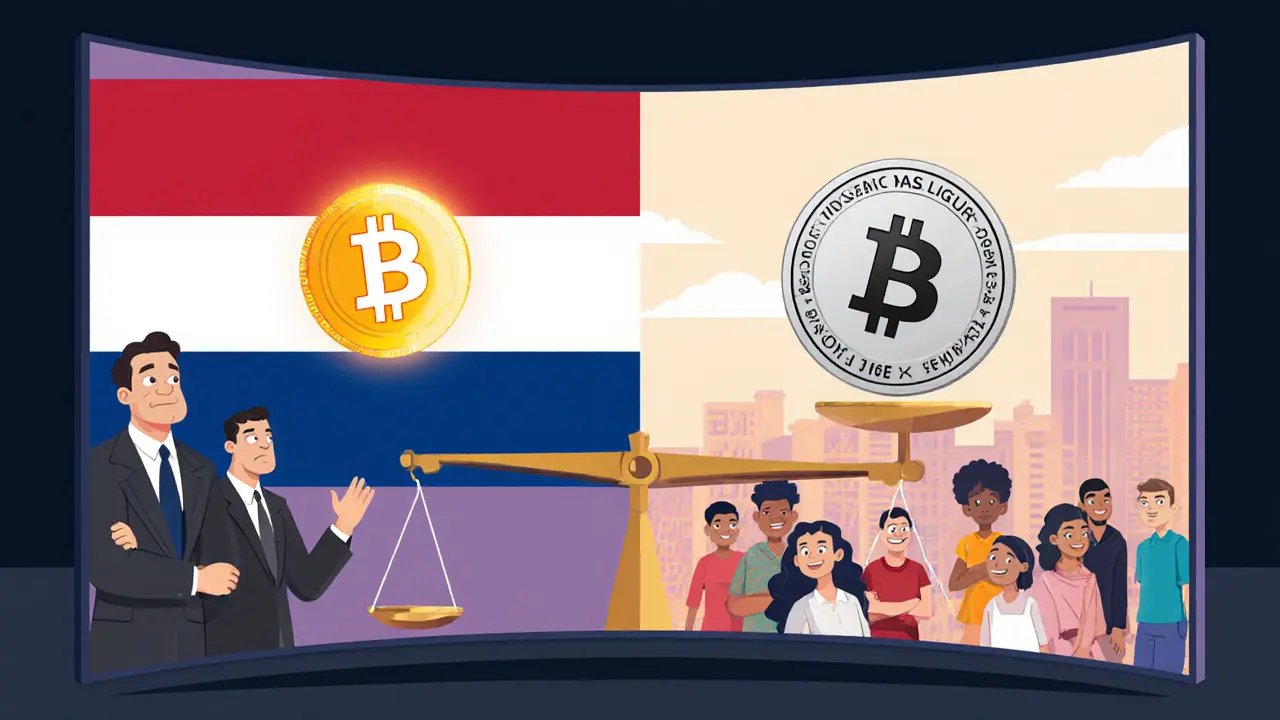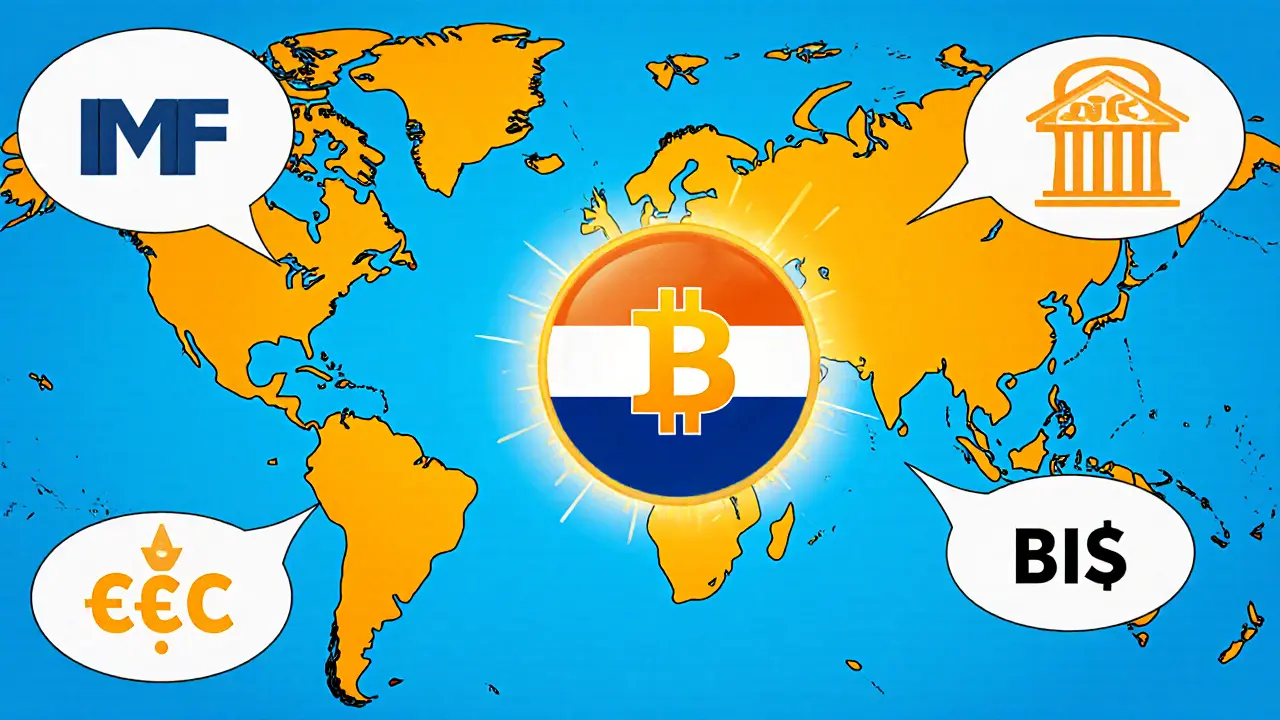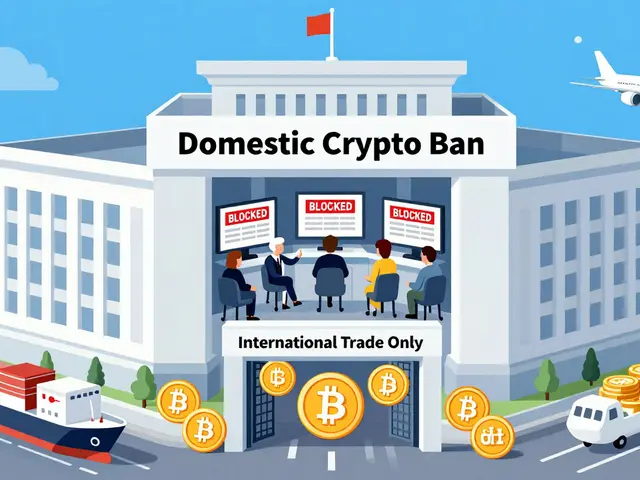Bitcoin Legal Tender vs CBDC Comparison Tool
How Does Bitcoin Legal Tender Compare to CBDC?
Based on El Salvador's experience and global digital currency implementations, compare key attributes of Bitcoin as legal tender versus Central Bank Digital Currencies (CBDCs).
Bitcoin Legal Tender
Key limitations:
- 88% of merchants convert Bitcoin to dollars immediately
- Only 20% of firms accept Bitcoin in practice
- Price volatility creates economic instability
- AML compliance challenges
Source: NBER working paper by Alvarez, Argente, and Van Patten
Central Bank Digital Currency (CBDC)
Key advantages:
- Stable value with government backing
- Stronger AML compliance frameworks
- Preserves monetary policy control
- Lower transaction costs for remittances
Source: IMF, World Bank, and global CBDC implementations (Bahamas, Nigeria, Jamaica)
Key Takeaways
When El Salvador announced that Bitcoin would sit side‑by‑side with the US dollar as official money, the world stopped scrolling. The move was bold, controversial, and instantly turned the tiny Central American nation into a case study for every regulator, economist, and crypto‑enthusiast on the planet. What has happened in the three years since the law took effect? How have governments, scholars, and the broader crypto community responded? This article breaks down the international fallout, the data behind adoption, and what the experiment means for future policy.
What the law actually says
El Salvador's Bitcoin legal tender law was signed on 9 June 2021 and became enforceable on 7 September 2021. Article 7 makes Bitcoin a compulsory means of payment: any economic agent must accept it when a buyer offers it, and debts can be discharged in Bitcoin without limitation. The law does not replace the US dollar; instead it creates a dual‑currency system where both assets are legal tender.
The government built an automatic conversion engine that swaps Bitcoin for dollars at market rates, keeping accounting standards in US‑dollar terms. A cap of 21 million Bitcoin was baked into the legislation to avoid supply‑side inflation, and the state rolled out the Chivo Wallet app, offering a $30‑Bitcoin bonus to jump‑start usage.
Technical rollout and on‑the‑ground reality
Implementation hinged on three pillars: the Chivo Wallet, a network of Bitcoin ATMs, and an institutional conversion service that instantly turned incoming Bitcoin into dollars for merchants. Early reports showed a spike in wallet downloads - roughly 50 % of households installed Chivo within weeks - but subsequent transaction data painted a different picture.
According to a 2023 NBER working paper by Alvarez, Argente, and Van Patten, only 20 % of firms actually accepted Bitcoin in practice, and merely 5 % of total sales were settled in the cryptocurrency. Moreover, 88 % of merchants immediately converted received Bitcoin into dollars, indicating a lack of confidence in holding the digital asset. The average active user made just 2.59 ATM withdrawals, suggesting that a tiny core of enthusiastic adopters drove most of the system’s activity.
How global monetary authorities reacted
International regulators were swift to voice concerns. The International Monetary Fund (IMF) warned that the law exposed the country to “significant macro‑economic risks” and called for a comprehensive impact assessment. The World Bank echoed the sentiment, emphasizing potential threats to anti‑money‑laundering (AML) frameworks.
| Organization | Primary Concern | Overall Stance |
|---|---|---|
| International Monetary Fund | Fiscal stability, AML compliance | Critical |
| World Bank | Financial inclusion claims vs reality | Critical |
| European Central Bank | Precedent for decentralized legal tender | Cautiously skeptical |
| Bank for International Settlements | Impact on global payment networks | Neutral‑to‑critical |
These bodies share a common thread: Bitcoin’s price volatility, the forced‑tender clause, and the uncertainty around AML enforcement make the experiment a regulatory red flag.

Legal scholars weigh in on the forced‑tender clause
Law professor Dror Goldberg, an expert on compulsory tender law, argues that the requirement for every seller to accept Bitcoin violates basic principles of freedom of contract. In his view, forced tender traditionally compels producers to surrender goods for paper money, but extending that to a decentralized, volatile asset creates “a severe violation of property rights.” Most jurisdictions, including the United States, deliberately avoid forced‑tender statutes for exactly this reason.
Critics also point out that the US dollar remains legal tender without a forced‑acceptance provision; businesses can legally refuse cash in many contexts. By making Bitcoin compulsory while leaving the dollar optional, El Salvador creates an asymmetrical legal framework that many scholars deem unsustainable.
Crypto community’s enthusiastic endorsement
In stark contrast, the global crypto community cheered the law as a historic validation of Bitcoin’s legitimacy. Influencers, venture capitalists, and blockchain entrepreneurs framed the move as “the first domino in worldwide crypto adoption.” Many argued that a sovereign endorsement would accelerate the development of decentralized finance (DeFi) services, cross‑border remittance solutions, and the broader push for financial sovereignty.
Industry analysts at PwC noted that the law offered a real‑world laboratory for testing Bitcoin’s use in everyday transactions, even if early metrics were underwhelming. Their report emphasized three reasons El Salvador gave for the policy: reducing remittance costs (which affect >20 % of the population), expanding access for the 70 % without formal banking, and spurring domestic wealth circulation.
What the data says about adoption
The NBER study highlighted several key findings:
- Half of households downloaded the Chivo Wallet in the first month, but 60 % of those users made no subsequent transactions.
- Only 20 % of firms complied with the legal requirement to accept Bitcoin.
- Merchants converted 88 % of received Bitcoin into dollars within seconds.
- The user base skewed young, male, and already banked - the very segment the law aimed to help.
These numbers suggest that while the legal framework forced a technical rollout, genuine economic uptake remains limited. The promised boost to financial inclusion has not materialized for the most vulnerable groups.

How El Salvador’s experiment compares to CBDC initiatives
Over 100 countries are now piloting or deploying central bank digital currencies (CBDCs). The Bahamas, Nigeria, and Jamaica have already launched sovereign digital tokens that retain government backing and monetary policy control. By contrast, El Salvador handed a portion of its monetary sovereignty to a decentralized network that cannot be steered by the central bank.
This distinction fuels ongoing debate: should developing economies prioritize the stability of a CBDC, or gamble on the transformative potential of a decentralized asset? Most experts now argue that the CBDC model offers a safer path to digital inclusion, whereas El Salvador’s approach serves as a cautionary tale of volatility and limited real‑world usage.
Future international implications
Policymakers worldwide are watching closely. The mixed results - a headline‑grabbing legal experiment, but modest on‑the‑ground impact - suggest that any future attempts to declare Bitcoin legal tender will likely be more measured. Countries considering similar moves are weighing three scenarios:
- Adopt a hybrid system where Bitcoin remains a “voluntary” payment method, avoiding forced‑tender language.
- Launch a CBDC that mirrors Bitcoin’s speed but retains central control.
- Focus on improving remittance corridors and financial literacy rather than altering legal tender status.
In the end, the experiment has already reshaped the conversation. International regulators now include “cryptocurrency legal tender risk” in their policy frameworks, and the academic literature cites El Salvador as the primary case study for sovereign crypto adoption.
Key takeaways for policymakers and analysts
- El Salvador Bitcoin law proved that legal enforcement does not guarantee market adoption.
- International bodies (IMF, World Bank, ECB) remain skeptical due to volatility and AML concerns.
- Legal scholars warn that compulsory Bitcoin acceptance may breach property‑rights principles.
- The crypto community sees the move as a milestone, but practical usage data tells a quieter story.
- Future digital currency strategies are likely to favor CBDCs over decentralized legal tender.
Why did El Salvador choose Bitcoin instead of a CBDC?
President Nayib Boluña argued that Bitcoin’s decentralized nature would protect the economy from external shocks, lower remittance fees, and signal a break from traditional banking systems. At the time, no CBDC existed that could meet those goals, so Bitcoin was seen as the fastest way to achieve a digital‑first vision.
What were the IMF’s main criticisms?
The IMF highlighted three risks: (1) Bitcoin’s price volatility could destabilize public finances; (2) the forced‑tender clause undermines contractual freedom; and (3) the legal framework complicates AML and counter‑terrorism financing monitoring.
Has the law improved financial inclusion?
Data shows limited impact. While Chivo Wallet downloads were high initially, only a small fraction of the unbanked population began using it regularly. Most active users were already banked, educated, and tech‑savvy.
Do merchants really have to accept Bitcoin?
Legally, yes - Article 7 mandates acceptance. In practice, compliance is low; only about one‑fifth of businesses report actually taking Bitcoin, and many convert it to dollars instantly.
What lessons can other countries learn?
The biggest lesson is that legal mandates alone won’t drive adoption. Successful digital currency strategies need stable value, clear AML frameworks, and genuine incentives for both consumers and merchants. Many analysts now view CBDCs as a safer route for achieving similar inclusion goals.




Comments (16)